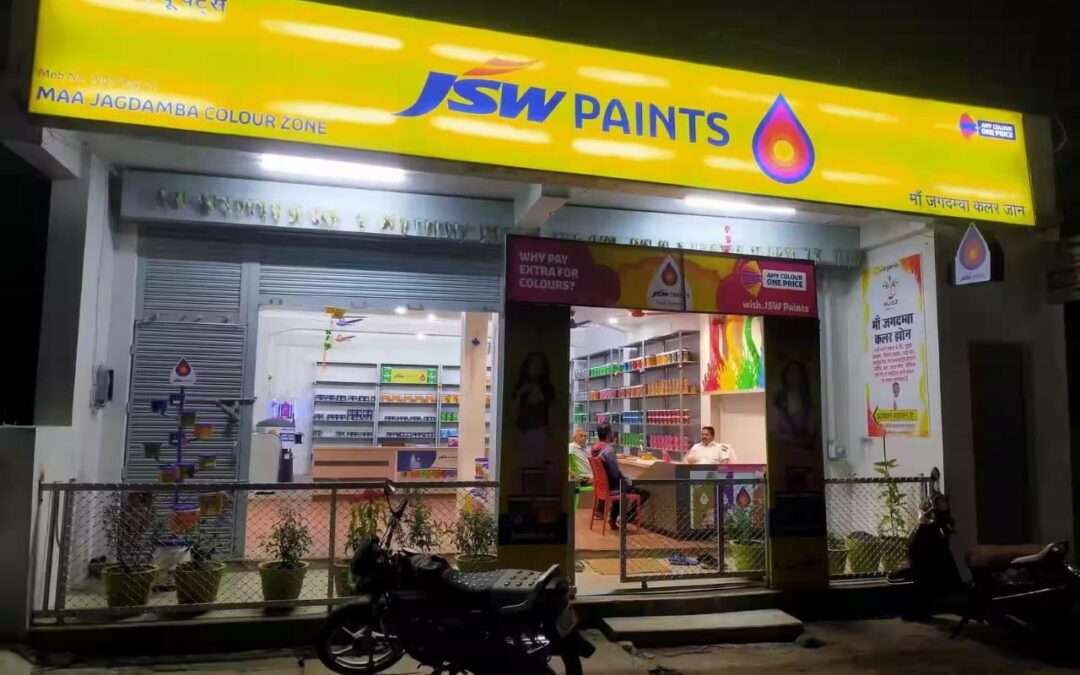Synopsis:
JSW Paints gained CCI approval to acquire a 75% stake in Akzo Nobel India, strengthening its market position and competing directly with India’s leading paint companies.
Known for its expertise in paints and coatings, the company is now in focus after the Competition Commission of India approved JSW Paints’ plan to acquire up to a 75% stake through a share purchase agreement and open offer. This article explores the details of the acquisition and managements views on this.
Akzo Nobel India Limited’s stock, with a market capitalisation of Rs. 15,459 crores, rose to Rs. 3,419.90, hitting a high of up to 1.16 percent from its previous closing price of Rs. 3,380.50. However, the stock over the past year has given a negative return of 8 percent.
What Happened
The Competition Commission of India (CCI) has cleared the proposal from JSW Paints to buy a majority stake in the Indian arm of Akzo Nobel, the Dutch paint company. This approval allows Sajjan Jindal-led JSW Paints to move ahead with its plan to strengthen its position in India’s fast-growing decorative paints market.
The deal, which was first announced on June 27, will see JSW Paints acquire a 74.76% stake in Akzo Nobel India, the maker of the well-known Dulux paint brand, for Rs 8,986 crore. Along with this, the company has also made an open offer to purchase up to 25% more shares from public investors for Rs 3,929.06 crore, taking the total transaction value to Rs 12,915 crore.
If the acquisition goes through completely, JSW Paints will become the fourth-largest company in India’s paint sector. Akzo Nobel said that selling its Indian business to JSW Paints was part of a plan to combine its global product strengths with JSW’s on-ground execution in the local market.
According to the company, JSW Paints’ strong domestic reach and ability to understand customer needs in India will help create more value than Akzo could achieve on its own. This move will also put JSW Paints in direct competition with leading names like Asian Paints, which is already dealing with rising raw material costs and growing pressure from new and aggressive rivals, including Birla Opus from Kumar Mangalam Birla’s group.
Management Commentry
Akzo Nobel CEO Greg Poux-Guillaume explained that the decision to sell was about finding the right partner for both the company and its people. He said that even though Akzo Nobel had strong brands and high-quality products, it lacked the local strength needed to fully tap into India’s huge market opportunities. At times, being a multinational also meant the company was distracted and unable to fully turn its potential into growth and market share.
He added that JSW Paints, backed by the larger JSW Group, has the scale and execution capability required to achieve this growth. Pointing to JSW’s proven success in multiple industries, Poux-Guillaume said he was confident that joining forces under Parth Jindal’s leadership will take the combined business to a much higher level.
Also read: Stock Split: 2 Stocks in focus as they are set to turn ex-stock split tomorrow
Q1 Financial Update
Akzo Nobel reported revenues of Rs. 995 crore in Q1FY26, down 4% YoY from Rs. 1,036 crore in Q1FY25 and lower by 3% QoQ compared to Rs. 1,022 crore in Q4FY25. Profitability also weakened, with net profit at Rs. 91 crore, declining 21% YoY from Rs. 115 crore and falling 16% QoQ from Rs. 108 crore.
Despite the near-term decline, long-term performance remains healthy with a 3-year profit CAGR of 14% and sales CAGR of 9%. The company’s return on equity has expanded strongly, registering a robust 3-year CAGR of 30%, reflecting its ability to efficiently generate shareholder value over time.
Written By Fazal Ul Vahab C H
Disclaimer

The views and investment tips expressed by investment experts/broking houses/rating agencies on tradebrains.in are their own, and not that of the website or its management. Investing in equities poses a risk of financial losses. Investors must therefore exercise due caution while investing or trading in stocks. Trade Brains Technologies Private Limited or the author are not liable for any losses caused as a result of the decision based on this article. Please consult your investment advisor before investing.


